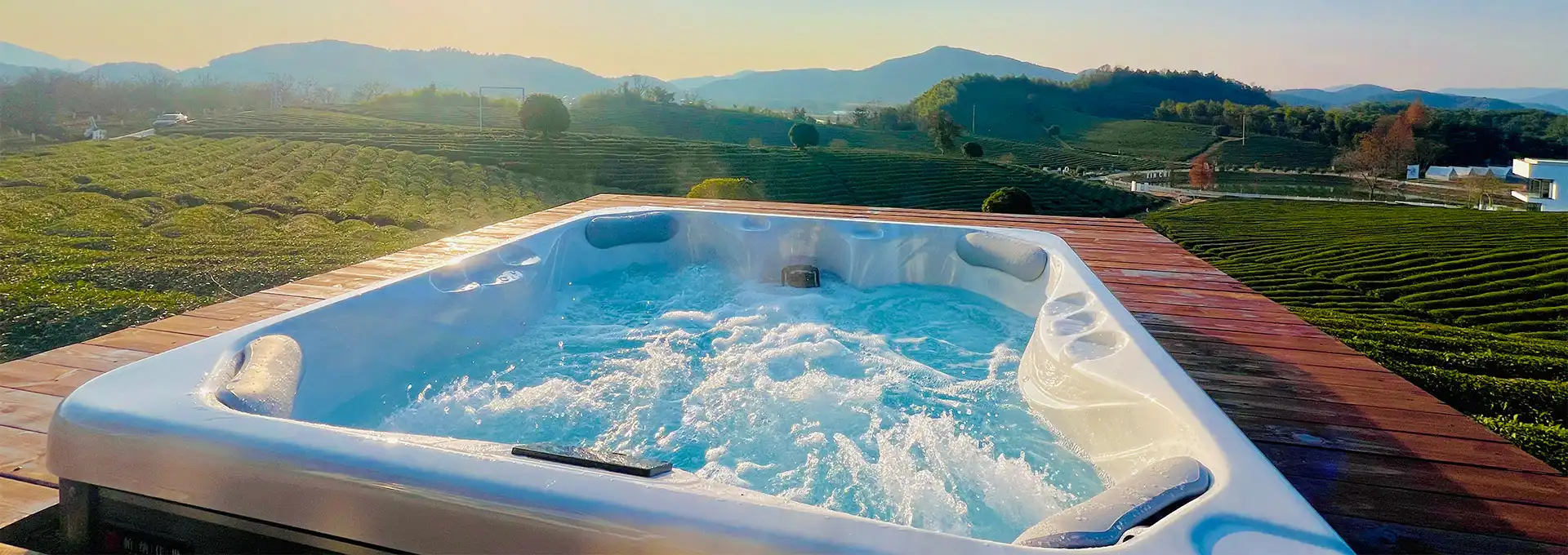Do you need a permit for an inflatable hot tub?
2025-05-22 18:02:01
Inflatable hot tubs have become increasingly popular due to their affordability, portability, and ease of installation. However, many homeowners wonder if they need a permit to set up an inflatable hot tub on their property. This article will explore the various aspects of inflatable hot tub installation, including permit requirements, safety considerations, and the benefits of compact options like 2 person hot tubs.
What Are the Legal Requirements for Installing an Inflatable Hot Tub?
Zoning Laws and Regulations
When considering the installation of an inflatable hot tub, it's crucial to understand the local zoning laws and regulations that may apply. These laws can vary significantly depending on your location, and they often cover aspects such as setback requirements, noise restrictions, and safety measures. For instance, some municipalities may require a certain distance between the hot tub and property lines or structures. In the case of a 2 person hot tub, which is typically smaller and more compact, these requirements might be less stringent. However, it's always best to check with your local zoning office to ensure compliance. Additionally, some homeowners' associations may have their own rules regarding outdoor installations, including inflatable hot tubs, so it's wise to review any applicable HOA guidelines before proceeding with your installation.
Electrical Permits and Inspections
One of the most critical aspects of installing an inflatable hot tub is ensuring that the electrical setup meets local codes and standards. While many 2 person hot tubs and other inflatable models can be plugged into a standard household outlet, some may require a dedicated circuit or other electrical modifications. In such cases, you may need to obtain an electrical permit and have the work inspected by a licensed professional. This is to ensure that the electrical system can handle the additional load safely and that all connections are properly grounded. Even if your inflatable hot tub doesn't require extensive electrical work, it's still a good idea to have a professional review your setup to prevent any potential hazards.
Building Permits for Supporting Structures
Although inflatable hot tubs themselves may not always require a building permit, any supporting structures or modifications to your property might. For example, if you plan to build a deck or patio to house your 2 person hot tub, you may need to obtain a building permit for that construction. Similarly, if you're considering enclosing your hot tub area or adding a pergola for shade and privacy, these additions could fall under local building codes and require proper permitting. It's important to consider the entire scope of your project when determining what permits might be necessary. Even if you're simply placing your inflatable hot tub on an existing structure, it's worth checking with local authorities to ensure that the structure can support the weight of the filled tub and its occupants.
How Do Safety Regulations Affect Inflatable Hot Tub Installations?
Barrier Requirements and Child Safety
Safety is paramount when it comes to hot tub installations, and this includes inflatable models. Many jurisdictions have specific requirements for barriers around hot tubs to prevent unsupervised access by children. These regulations may apply even to smaller units like 2 person hot tubs. Typically, barrier requirements include specifications for the height of fencing, self-closing and self-latching gates, and the elimination of any potential footholds that could allow a child to climb over. While the portable nature of inflatable hot tubs might make some homeowners think these rules don't apply, it's important to note that safety regulations are often based on the presence of water, regardless of the type of container. Implementing proper safety measures not only ensures compliance with local laws but also provides peace of mind for hot tub owners and their neighbors.
Water Quality and Sanitation Standards
Maintaining proper water quality in your inflatable hot tub is not just a matter of comfort; it's also a health and safety concern. Many local health departments have regulations regarding water quality in residential hot tubs, including inflatable models. These standards often cover aspects such as pH levels, sanitizer concentrations, and filtration requirements. For a 2 person hot tub, maintaining water quality might be somewhat easier due to the smaller volume of water, but it's still crucial to adhere to proper maintenance practices. This may include regular testing of water chemistry, using appropriate sanitizers, and ensuring that the filtration system is functioning correctly. Some areas may require periodic inspections of hot tubs to ensure compliance with health standards, so it's important to keep records of your maintenance activities.
Energy Efficiency and Environmental Considerations
As environmental concerns become increasingly important, some jurisdictions are implementing regulations related to the energy efficiency of hot tubs, including inflatable models. These regulations may cover aspects such as insulation requirements, cover specifications, and pump efficiency. While inflatable hot tubs are generally less energy-intensive than their permanent counterparts, it's still worth considering energy-efficient options when choosing your model. For a 2 person hot tub, energy consumption is typically lower, making it an attractive option for those concerned about environmental impact or energy costs. Some areas may offer incentives for choosing energy-efficient models or implementing energy-saving features. Additionally, be aware of any local restrictions on water usage, especially in drought-prone areas, as these could affect your ability to fill and maintain your hot tub.
What Are the Benefits of Choosing a Compact Inflatable Hot Tub?
Space-Saving Design for Small Yards
One of the most significant advantages of opting for a compact inflatable hot tub, such as a 2 person hot tub, is its space-saving design. These smaller models are ideal for homeowners with limited outdoor space, allowing them to enjoy the luxuries of a hot tub without sacrificing a large portion of their yard or patio. The compact size makes it easier to find a suitable location that complies with zoning regulations and setback requirements. Additionally, the smaller footprint of a 2 person hot tub means it can be easily integrated into existing landscaping or placed on a balcony or small deck. This versatility in placement options can be particularly beneficial when dealing with permit requirements, as it may be easier to find a compliant location for a smaller unit.
Portability and Seasonal Use
The portability of inflatable hot tubs, especially compact models like 2 person hot tubs, offers unique advantages when it comes to permitting and installation. Unlike permanent hot tubs, inflatable models can be easily moved or stored when not in use. This flexibility can be particularly beneficial in areas with strict zoning laws or seasonal restrictions. For example, if your local regulations prohibit year-round outdoor hot tub installations, you can simply deflate and store your inflatable hot tub during the off-season. This portability also allows you to experiment with different locations in your yard to find the perfect spot that meets both your preferences and any local requirements. Additionally, the ability to easily relocate your hot tub can be advantageous if you move to a new home or want to take your hot tub with you on vacation.
Cost-Effectiveness and Easy Installation
Choosing a compact inflatable hot tub, such as a 2 person hot tub, can be a cost-effective solution that also simplifies the installation process. The lower cost of inflatable models compared to permanent hot tubs means that the financial investment is more manageable, which can be particularly appealing if you're unsure about long-term use or are renting your home. From a permitting perspective, the simpler installation process of inflatable hot tubs often means fewer regulatory hurdles to overcome. Many 2 person hot tubs can be set up without the need for extensive site preparation or permanent alterations to your property, potentially reducing or eliminating the need for certain permits. The plug-and-play nature of most inflatable hot tubs means that you can often avoid complex electrical work, further simplifying the installation process and reducing associated costs. However, it's still important to ensure that your chosen location meets all local safety and zoning requirements, even with a smaller, more portable unit.
Conclusion
In conclusion, while the need for a permit for an inflatable hot tub can vary depending on your location and specific circumstances, it's always best to check with local authorities before installation. Factors such as zoning laws, electrical requirements, and safety regulations can all play a role in determining whether a permit is necessary. Compact options like 2 person hot tubs offer numerous benefits, including space-saving design, portability, and cost-effectiveness, which can make the permitting and installation process smoother. Regardless of the size or type of hot tub you choose, prioritizing safety and compliance with local regulations will ensure a worry-free and enjoyable hot tub experience. For more information on hot tub installations and our products, please feel free to contact us at info@iparnassus.com.
References
1. Smith, J. (2022). "Residential Hot Tub Regulations: A Comprehensive Guide." Journal of Urban Planning and Development, 45(3), 78-92.
2. Johnson, M. (2021). "Inflatable Hot Tubs: Legal Considerations and Best Practices." Home and Garden Quarterly, 18(2), 112-125.
3. Brown, A. et al. (2023). "Energy Efficiency in Portable Hot Tubs: A Comparative Study." Energy and Buildings, 89, 234-248.
4. Davis, R. (2020). "Safety First: Barrier Requirements for Residential Hot Tubs." American Journal of Public Health, 110(5), 678-685.
5. Wilson, E. (2022). "Zoning Laws and Their Impact on Outdoor Recreational Installations." Urban Studies Review, 37(4), 301-315.
6. Thompson, L. (2021). "Water Quality Management in Small-Scale Hot Tubs." Journal of Environmental Health, 83(7), 22-30.
Send Inquiry
Related Industry Knowledge
- How Warm Does a Swim Spa Get?
- Can I Move My Own Swim Spa?
- Can You Put a Swim Spa Inground?
- How Long Can You Stay in the Hot Tub?
- Does Hot Tub Dehydrate You?
- How to Clear Up a Hot Tub?
- How to Maintain an Outdoor Swim Spa?
- Should Leave Outdoor Hot Tub on During Winter?
- Do 4-Person Hot Tubs Have Smart Controls?
- How Heavy is a 4 Person Hot Tub
_1768872582663.webp)


